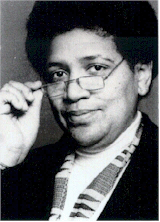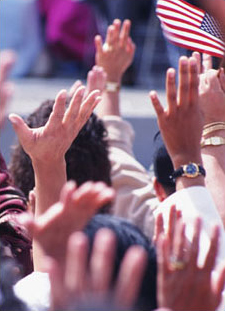 |
||||
|
Different Views of Women's Liberation
A Black Woman's View Of Women's Liberation
(Note: Brenda Eichelberger was a founding member of the National Black Feminist Organization. This interview was published in Secret Storm, the publication of the CWLU Outreach Committee.) Brenda Eichelberger is a black women who lives on the South side of Chicago. She works as a counselor at Bryant Elementary School. Brenda is a founding member of the National Black Feminist Organization. In this interview, Secret Storm talked about being a black women and her feelings and ideas about women's liberation. SS: How did you first get interested in women's liberation? Brenda: For as long as I can remember I've been a feminist, even when I didn't know that word existed. My brother is very close to my age, and when we were growing up I couldn't understand the benefits he got. If he had been older then I might have understood, but he wasn't that much older than me. For instance, he got the top bunk bed because he was a boy, even though I wanted it. Then we both wanted a bike and our family had only enough money for one, my brother got it. Also, living in the city, I had housework to do but my brother had "no soil to till.Ē I really got involved in women's liberation by reading about the National Black Feminist Organization in the May, 1974, MS magazine. Before reading that article, I didn't know any other black woman felt the way that I did about feminism. I knew white women who were my friends, but they didn't have the added oppression of race. A lot of black groups were macho. I couldn't completely identify with any group. Anyway, all I need to know was that one woman anywhere who felt like I did. I got busy organizing the National Black Feminist Chapter in Chicago. SS: What problems do you face as a black woman? Brenda: From the standpoint of being black, black women live in neighborhoods with lots of crime. Also, the guilty of goods and services is poor. For example, clothing stores don't have much selection or good quality clothes. Black women shop in groceries that stock poor quality food at high prices. Black women have less chance to pick up a good book or magazine to find out what's happening at the drugstore because they have a poor selection mainly, "True Confessions, etc." All the time you are aware of the very heavy security in stores. Black women are discriminated against in schools, jobs and health care. If you are on welfare, you receive bad treatment. Most blacks must wait hours in line before seeing a doctor. For years white upper and middle class women could afford to get safe abortions. Black women either had a child or had an unsafe abortion. Some black women have been sterilized against their will or without even knowing what is being done to them. Puerto Rican and black women were used as guinea pigs to test the "pill" before it was marketed. Black women often are unknowing guinea pigs in medical research. Black women have special health problems, like a high rate of hypertension and an increasing suicide rate (80% in the last 20 years). From the standpoint of the black woman, black men come out of a macho orientation. Many black men feel that black women should stand behind them, not beside them. This is hard to fight because black men are easily threatened by women's independence. This is because society has a pecking order and when a black man needs to vent anger or anxiety he'll take it out on the one group lower than he is - the black woman. The NBFO is setting up consciousness raising groups (rap groups) for black men. Black men and women have to learn to live and work together with respect. We also work with predominately white groups if we have the same goal. SS: What can black women do? Brenda: Get into an organization like the NBFO. You have to work with other women to change things. If black women don't stand up and do together what we've been trying to do individually, we will only get small successes like a college degree, a house, or a good job. These small successes make some black women feel that they're better than others. In this way, the space between people is widened when we should be closing it. This is how we are kept oppressed. SS: How has NBFO changed your life? Brenda: I met really great women I couldn't have met anywhere else. I could never have this great a relationship with another woman as I do with women in NBFO. I get high knowing that black women, the most oppressed group in America, can be a powerful force when we get together. When we work together we're unlimited - we can't be divided. The National Black Feminist Organizationís Chicago Chapter welcomes all black women. They have a monthly meeting that rotates around the city, also, a monthly newsletter, consciousness raising groups and workshops. NBFO will help you with childcare and transportation so you can attend. (Note: The National Black Feminist Organization no longer exists.)
STAND UP AND BE COUNTED
(Note: A film review of the movie "Stand Up and Be Counted" which explored how women were changed by the women's liberation movement.) There's a flick playing around the neighborhoods that everybody should check out. It's called "Stand Up and Be Counted", and it's about women's liberation. The story takes place in Denver and the main characters include a career girl, her sister and her mother. The sister is very into both the ideas of women's liberation and building a movement. The mother belongs to a womenís liberation group for older women. At the start of the movie, the career girl does not like women's liberation at all, thinks her sister is sorta nuts and that the movement is rather extreme. The movie shows the changes she goes through and how she comes to understand, support, and be a part of the movement. Thatís the strongest point of the film - it shows women going through changes, and how painful the realizations that you're oppressed - that your husband doesn't listen when you talk, that your boss just doesn't give a shit about your working conditions, that even though he 'helps', the housework is still women's work - how painful these realizations are. It's so easy to see your self in the women in the film. It's amazing - they say things we've all said to each other, to our children, and to our husbands and boyfriends. You can really feel what they're feeling too. The heaviest scenes come down with this mother of three little kids and her husband. He never has time to talk to her, he doesn't take her ideas seriously (much less her emotions). She does all the housework, takes care of the kids by herself, you know, the whole bit. One day the baby-sitter finds some really good sketches of women's fashions that she had done over the years. The sitter convinces her that they're good, she takes them to some designer and he offers her a job, working at home, in her own time. She tries several times to tell her husband about it, but he never has time to listen. After about a month, he tells he was fired three weeks before and has just been offered a job in New York City, that she will have to stay behind with the kids and sell the house, since he has to move RIGHT NOW. She starts off with trying to tell him that she has a job and that she could support them until he found another job in Denver, but he just doesn't listen. Besides, she says, she doesn't want to live in New York City (what a place to raise kids!). Many tears later; he leaves for New York, still not understanding why she is holding out. You can tell that she decided that she wasn't going to simply pick up and leave Denver on a moment's notice, that she was going to start to think about what she wanted. With one exception, the film mainly dealt with women's liberation and how it relates to our relationships with men - fathers, boyfriends and husbands, not with the part of women's liberation that deals with building a new society for everyone. But what it does it does well. The audience reaction is amazing. You can see men shrinking in their seats at certain scenes, and getting really hostile at other. And then there are points where all the women clap and you can feel the unity among the women in the audience. Of course, where you watch the credits at the end, there's only one woman on the crew. Well, we'll get to that next time around. Everyone should go and see Stand Up and Be Counted. Bring sisters, mother, brothers, husband or boyfriends. Everyone will have strong feelings about it and there sure will be a lot of discussion.
|
|
|||
|
|
||||
|
|
||||
 |
|
 |
||

